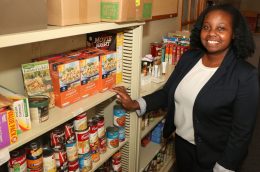Content provided by The Manhattan Mercury
Sarah Barrett literally followed her dreams and came to Kansas State University.
“I had a dream three weeks before (high school) graduation and I decided to switch … to K-State,” she said. “I went to my guidance counselor the next day and she told me I missed basically all the deadlines, but everyone worked with me and I came to school.”
That was back in 2004.
She now works at the university as a Cleary Act federal compliance coordinator, making sure the university reports crimes properly, helps with federal aid, grants and “continues the mission of serving students,” she said.
However, she also recently turned her personal struggles into her passion and second aspect of her job.
Barrett is the supervisor of a new on-campus food pantry, part of the FEED K-State Initiative, to assist students, something she struggled with throughout her undergraduate years and even before that. FEED stands for Fueling Education Excellence Daily.
“We were homeless for a time when I was a kid,” she said. “That didn’t get better as I got older.”
Barrett is one of six children, so she said she had to pay for college on her own. She received some scholarships to help with tuition costs, but books and fees made it hard for her to have money to buy groceries.
Now she takes what she encountered and turned it into a way to help others. University entities have tried to create an on-campus food pantry for students who struggle to get enough to eat for years, but now Barrett is the supervisor and said she is excited to help students.
“Food insecurity is a continuum. If you have nothing for lunch or no lunchbox but you’re on campus for nine hours, it’s the consistent inability to get food and looking for food daily,” she said. “There is a need and it is a reality for a lot of students. As a university, it’s a major detriment and has been for decades.”
She said some students are not likely to express their needs because of the stigma and their desire to fit in. The university released survey results that said 39.4 percent of students had trouble getting enough food.
Barrett said it is hard to identify students in need, which she experienced firsthand.
“I was involved in college, I had a high GPA, I worked multiple jobs and I seemed happy and healthy, when really I skipped meals a lot,” she said.
While she said the new responsibility has been a lot of work, she had to do something.
“I’m just part of a larger group and a lot have been a part, but it’s tied to who I am, knowing myself what it was like,” she said.
Barrett secured a space, in 009 Fairchild Hall, got grants for funding and hired a staff member to help make the pantry a reality. The task hasn’t gone unnoticed by her peers.
“She has a lot of drive and is one of the most ambitious people that I know,” said Tamara Bauer, instructor in the Staley School of Leadership Studies and one of Barrett’s former bosses at K-State. “She’s pretty incredible. She had the ability to take adversity to help others, to become a social justice and human advocate. It is an honor to be a friend and a co-worker.”
She may not stay at K-State forever, especially if she keeps dreaming at night.
After graduation, she worked for a study abroad agency in Texas, where she coordinated 200 study abroad programs in various countries, including Spain, where she studied herself as an undergrad. She beat out hundreds of applicants for a cultural advocate position. Barrett came back to K-State for graduate school and had another dream.
“I worked as a graduate assistant and I had an idea of what (my current position) would look like,” she said. “I wanted to make an impact on campus.”
Barrett said she hopes people interested in helping with the food pantry contact her to get involved.
“We’re always interested in what people have to offer, whether it’s time, financially or donations,” she said.
Currently, the food pantry is accepting non-perishable foods, but hopes to expand in the future to perishable items.
She also said the pantry will take monetary donations to help students afford personal hygiene products as well. They will also be taking donations of pots, pans, Crockpots and cookbooks, so students can learn how to prepare their food.